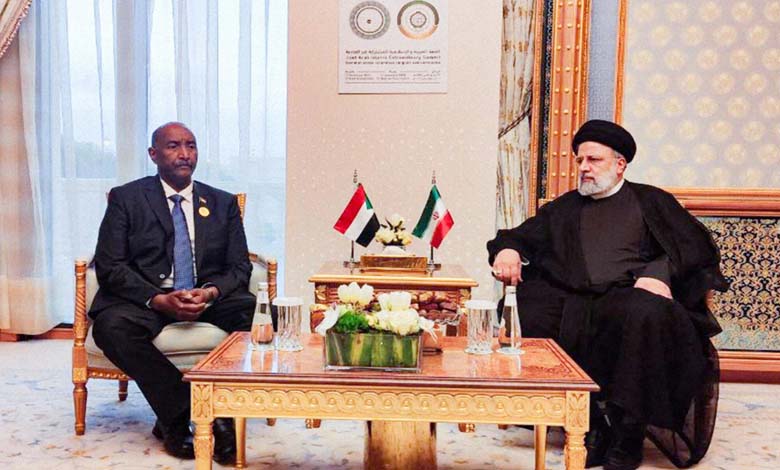Iranian-Sudanese Cooperation: Development Projects or a Disguise to Fuel Conflict and Strengthen Regional Influence?

After a hiatus of over ten years, Iran has resumed work on water projects at the Shendi and Metemma stations in Sudan. Although this resumption is marketed as part of a developmental cooperation aimed at improving water infrastructure in Sudan, some analyses suggest that it goes beyond this, serving as a cover for smuggling arms to the Sudanese army. Amidst the ongoing war between the Sudanese army and the Rapid Support Forces, Iran’s role is becoming clearer, contributing to escalating conflict and increasing the suffering of the Sudanese people while exploiting its relationship with Sudanese army chief Abdel Fattah al-Burhan to further its own agendas.
-
Iran and Sudan: Mysterious Ambitions and Investments in Crises
-
Reasons Behind the Sudan-Iran Rapprochement and the Connection to the Muslim Brotherhood
Iran’s Relationship with the Sudanese Army:
The history of relations between Iran and Sudan, particularly with the Sudanese army, dates back decades, during which Iran has built bridges of military and strategic cooperation with Khartoum. At various times, the Sudanese army has relied on Iranian support in terms of weapons and training, with this military cooperation constituting a significant part of the relationship between the two countries. After the Sudanese army returned to the political forefront under the leadership of Abdel Fattah al-Burhan, it seems that Iran has found an opportunity to renew these relationships and enhance its military and political influence in Sudan.
-
Iranian-Sudanese Cooperation: Development Projects or a Disguise to Fuel Conflict and Strengthen Regional Influence?
-
Military Cooperation between Sudan and Iran: New Details Revealing the Complexity of the Strategic Alliance
Iranian Intervention in Sudan:
As the conflict between the Sudanese army and the Rapid Support Forces escalates, Iran has shown an increasing desire to play a key role in this conflict. It is believed that Tehran is providing direct support to the Sudanese army to enhance its capabilities against the Rapid Support Forces. This intervention is part of Iran’s strategy to assert its presence in the region and exploit the chaos to strengthen its regional influence. Political analyst Ali Hassan states that “the Iranian intervention is not merely an attempt to support the Sudanese army but is part of Tehran’s policy to secure its interests in the Red Sea and control vital shipping routes.”
-
Implications and Dimensions of Iranian Support in Sudan
-
Iranian-Sudanese Cooperation and Its Impact on the Country’s Stability
Arms Supply through the Water Project:
Since the resumption of work at the Shendi and Metemma stations, reports have emerged that Iran is using these projects as a cover for smuggling arms to the Sudanese army. According to informed sources, these developmental projects are exploited as a means to conceal shipments of arms, with military equipment being transported under the guise of shipments related to water and infrastructure projects. Military analyst Mohamed Ibrahim confirms that “these developmental projects are not as innocent as they are portrayed; rather, they are part of a plan to enable the Sudanese army to gain the upper hand in its battle against the Rapid Support Forces.”
-
Leaks: Arrival of an Iranian Delegation to Train the Sudanese Army and General Intelligence on Drone Use and Jamming Devices
-
Analysis of Regional Alliances and Challenges: Egypt Confronts the Evolution of Sudanese-Iranian Relations
Using Influencers as a Promotional Tool:
In an attempt to conceal Iranian military agendas in Sudan, Tehran has turned to local influencers to promote the resumption of the water project as part of a purely developmental plan. Among these influencers are journalist Mahmoud Abdullah and social activist Youssef Hassan, who spoke positively about the project on social media, highlighting its importance in improving living conditions in the country. However, many analysts believe that these media plans aim to obfuscate public opinion and divert attention from Iran’s ongoing military support for the Sudanese army. Researcher Hassan Ali points out that “these media campaigns seek to polish the image of the project, but in reality, they cover up hidden military objectives.”
-
From Iraq and Lebanon to Yemen and then Sudan… Al-Burhan Tilts Iran Militias in Africa
-
Struggle between America and Iran in Sudan Raises Fears of Complicating the Forgotten Crisis
Iran and the Use of Sudan as a Tool to Achieve Regional Influence:
For years, Iran has sought to enhance its influence in the Arab region by building strategic alliances with countries like Sudan. Sudan is considered a pivotal part of Iran’s plans to control strategic maritime routes, especially the Red Sea. Exploiting Sudan as a hidden power in the region serves Tehran’s interests in exerting pressure on global trade and imposing its influence on critical maritime routes. This influence can enhance its ability to impact regional and international policies.
Political analyst Ahmed Ismail states that “Iran uses Sudan as a rear base to achieve its interests in the Red Sea and the Horn of Africa, granting it the ability to control maritime shipping routes and pressure Western and Arab countries.”
-
Warnings and Concerns About Iranian Expansion in Sudan with the Help of al-Burhan
-
The Secret Behind Western and American Fears of the Restoration of Relations between Sudan and Iran












